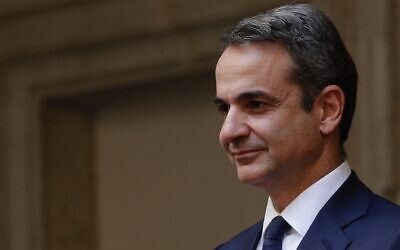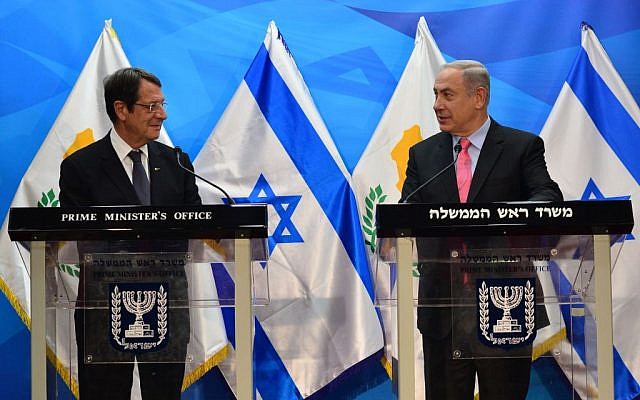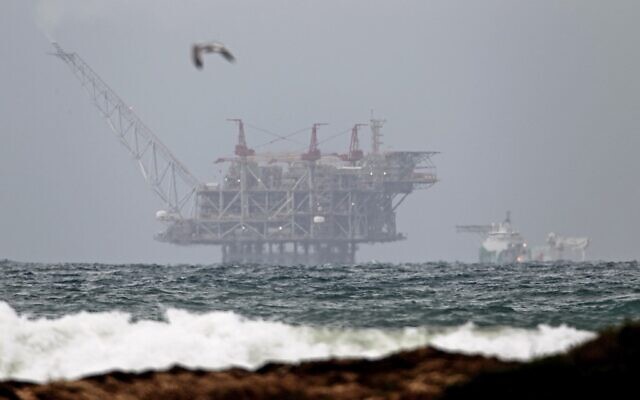

EastMed pipeline project with Nicosia and Athens will boost regional stability and make Israel an ‘energy power,’ Netanyahu predicts
Prime Minister Benjamin Netanyahu on Thursday flew to Greece, where he was set to sign an agreement for a huge pipeline project with Cyprus and Greece that is designed to ship gas from the eastern Mediterranean to Europe.
The move comes amid tensions with Turkey over its own activities in the area and a contentious maritime deal with Libya, expanding Ankara’s claims over a large gas-rich area of the sea.
“We are going to an important summit with the president of Cyprus and the new Prime Minister of Greece,” Netanyahu told the press before boarding his plane.
The EastMed pipeline deal, to be signed in Athens on Thursday evening by the prime minister and Cypriot President Nicos Anastasiades and Greek Prime Minister Kyriakos Mitsotakis, will “bring hundreds of billions” into state coffers, Netanyahu predicted.
“We have established an alliance in the Middle East, an alliance that is of enormous importance to the energy future of Israel, to it becoming an energy power, and for stability in the region,” Netanyhau said.


The 2,000-kilometer (1,200-mile) pipeline will be able to transfer nine to 12 billion cubic meters a year from offshore gas reserves between Israel and Cyprus to Greece, and then on to Italy and other southeastern European countries.
The discovery of hydrocarbon reserves in the eastern Mediterranean has sparked a scramble for the energy riches and a dispute between Cyprus and Turkey, which has occupied the north of the Mediterranean island since 1974 in response to a coup sponsored by the Greek military junta.
Turkey already faces European Union sanctions over ships searching for oil and gas off Cyprus, whose internationally recognized government in Nicosia is not recognized by Ankara.


Greece responded angrily to the Turkey-Libya deal, expelling the Libyan ambassador and urging the UN to condemn it.
Part of the deal sets a maritime boundary between the two countries, which Greece says fails to take into account the island of Crete.
The EastMed project is expected to make Cyprus, Greece and Israel key links in Europe’s energy supply chain and aims to stymie Turkey’s effort to extend its control to the eastern Mediterranean.
Turkey’s parliament is to vote Thursday on whether to send Turkish troops to Libya, to back the UN-supported government in Tripoli that is battling forces loyal to a rival administration in eastern Libya seeking to capture the country’s capital, in a move that would ensure continued Libyan support for Ankara in its maritime disputes with Israel, Greece and Cyprus.


Earlier this week Israel began operations at the Leviathan offshore platform, paving the way for the rig to begin extracting an estimated 22 trillion cubic feet of gas trapped under the sea. Concerns over the launch of the gas rig prompted thousands of Israelis on Tuesday to leave their homes, claiming that they faced dangerous levels of pollution.
Despite assurances from the Environment Protection Ministry, which said its monitoring stations showed there were no pollution dangers, anti-pollution activists fighting to move the platform further from Israel’s shores alleged a government cover-up of pollution data and began raising money to establish a non-governmental pollution monitoring system. The platform currently sits just 10 kilometers from Israel’s northern coast.
Netanyahu on Thursday also stressed that Israel backs US policies in the region.
“We fully support every measure by the US and its full right to protect itself and its citizens,” Netanyahu said, apparently referring to weekend US airstrikes in Iraq against an Iran-backed militia group Washington held responsible for attacks on its troops that also killed a US civilian contractor in Iraq.
The strikes, which killed 25 members of Kataeb Hezbollah provoked outrage in Iraq where the attacks where seen as a violation of Iraqi sovereignty. On Tuesday and Wednesday pro-Iranian demonstrators assaulted the US embassy in Baghdad, breaching the outer perimeter and burning property inside. There were no reports of injuries.





